八年级下语言点小结Unit4知识点练习
人教版英语八年级下册 Unit4知识点梳理和配套练习(无答案)

U4知识点梳理及配套练习语法点睛【例句】1. Why don’t you call him up to say sorry?= Why not call him up to say sorry?为什么不给他打电话道歉呢?2. You should tell your parents your real thoughts.你应该把你的真实想法告诉你的父母。
3. — Lisa is angry with me. What should I do?Lisa 在生我的气。
我应该做什么?— You could buy a gift for her.你不妨给她买个礼物。
4. What about having a surprise party for Tom?= How about having a surprise party for Tom?给汤姆办一个惊喜派对怎么样?5. Shall we go to the beach this weekend?这周末我们去海滩好吗?6. Let’s go to the old people’s home tomorrow.明天我们去敬老院吧。
【总结】※“Why not+ v.+ ...?”为省略句,其完整句式为“Why don’t you (we) + 动词原形+ 其他?”意为“为什么不……呢?”,常用于间接地向对方提出建议,往往带有肯定意味,一般不必回答,如例句1。
※“Sb should + v.+ ...”意为“你应该……”,用以表示劝告或推荐,如例句2。
※“Sb could + v.+ ...”意为“你不妨……”,其中could 并不是can 的过去式,而是更委婉地提出建议,如例句3。
※“What / How about + 名词/ 代词/ v.-ing 形式+ ...?”意为“……怎么样?”,是提建议或征求对方意见的委婉说法,如例句4。
※“Shall we / I + v. + ...?”意为“我们/ 我……好吗?”,常以商量的语气向对方提出建议,如例句5。
人教八年级下册Unit4知识点和练习(含部分答案)

Unit 4 Why don’t you talk to your parents?本单元话题:谈论烦恼并提出建议本单元重点语法:状语从句一、词汇达标1.允许;准许v________2.有毛病;错误的adj________3.哪儿不舒服__________4.午夜;子夜n________5.快速查看;浏览___________6.猜测;估计v_________7.协议;交易n______8.重要的事_________9.成功的发展;解决_______10.和睦相处;关系良好_________11.关系;联系;交往n______12.交流;沟通n_________13.争吵;争论v_________14.云;云朵n_________15.年纪较长的adj_____16.代替;反而;却adv_______17.任何;每一pron__________18.焦虑的;担忧的adj_________19.主动提出;自愿给予v _________20.正确的;恰当的adj_________21.第二;其次adv_________22.交流;沟通v_________23.解释;说明v_________24.清楚易懂的;晴朗的adj_________ 25.抄袭;模仿;复制;复印v_________ 26归还;回来;返回v_________27.再也不;不再adv_________28.成员;分子n_________29.压力n_________30.竞争;对抗v_________31.意见;想法;看法n_________32.技艺;技巧n_________33.典型的adj_________34.美式橄榄球;足球n_________35.删除;删去_________36.快的;迅速的;时间短暂的adj_________37.持续;继续存在v_________38.比较v_________39.比较;对比_________40.不理智的;疯狂的adj _________41.鞭策;督促;推动v_________42.发展;发育;成长n_________43.造成;引起v_________44.通常的;寻常的adj_________45.依...看_________46.可能;大概;也许adv_________二、短语达标1. have free time有空闲时间2. allow sb. to do sth. 允许某人做某事3. hang out with sb. 与某人闲逛4. after-school classes课外活动课5. get into a fight with sb. 与某人吵架/打架6. until midnight直到半夜7. talk to sb. 与某人交谈8. too many太多9. study too much学得过多10. get enough sleep有足够的睡眠11. write sb. a letter给某人写信12. call sb. up打电话给某人13. surprise sb. 令某人惊讶14. look through翻看15. be angry with sb. 生某人的气16. a big deal重要的事17. work out成功地发展;解决18. get on with不11睦相处;关系良:19. fight a lot经常吵架/打架20. hang over笼罩21. refuse to do sth. 拒绝做某事22. offer to do sth. 主动提出做某事23. so that以便24. mind sb. doing sth. 介意某人做某事25. all the time一直26. in future今后27. make sb. angry使某人生气28. worry about sth. 担心某事29. copy one’s homework抄袭某人的作业30. be oneself做自己31. family members32. spend time alone独自消磨时光33. give sb. pressure给某人施压34. have a fight with sb. 与某人吵架35. compete with sb. 与某人竞争36. free time activities业余活动37. get better grades取得更好的成绩38. give one’s opinion提出某人的观点39. learn exam skills学习应试技巧40. practice sports体育训练41. cause stress造成压力42. cut out删除三、重点知识梳理Section A1.look through 浏览e.g. He is looking through the books in the library.辨析:look around 四处张望look up 向上看;查找look into 调查look after 照顾;照看2 Although she’s wrong , it’s not a big deal.尽管她做得不对,但也没什么大不了的。
译林版八年级下册英语Unit 4 Reading知识点及练习(含答案)

青少年应如何正确使用手机演讲稿尊敬的老师、亲爱的同学们:
大家好!今天我想和大家谈谈一个现代青少年都面临的问题——手机的正确使用。
手机作为一种现代科技产品,已经成为我们生活中不可或缺的一部分。
但是,正确使用手机却是一个需要我们认真思考和努力实践的问题。
首先,手机的正确使用需要我们明确它的作用和限制。
手机作为一种通讯工具,可以帮助我们与家人、朋友保持联系,获取信息和知识。
但是,它并不是生活的全部。
我们不能沉迷于手机,忽略了身边的人和事。
我们要学会控制使用手机的时间,合理安排生活和学习,不能让手机成为我们的负担和累赘。
其次,正确使用手机需要我们保护个人隐私和信息安全。
在使用手机的过程中,我们要注意保护个人隐私,不要随意泄露自己的个人信息。
同时,我们也要加强手机信息安全意识,不要随意下载不明来源的软件和点击不明链接,以免给自己带来不必要的麻烦和损失。
最后,正确使用手机需要我们遵守社会公德和法律法规。
在使用手机的过程中,我们要尊重他人,不要在公共场合大声喧哗或打电话,不要在课堂上偷偷玩手机。
同时,我们也要遵守网络道德和法律法规,不要传播不良信息、违法信息,不要参与网络欺凌和网络暴力行为。
总之,正确使用手机是我们每个青少年都应该认真思考和努力实践的问题。
我们要明确手机的作用和限制,保护个人隐私和信息安全,遵守社会公德和法律法规。
只有这样,我们才能充分发挥手机的作用,让它成为我们生活和学习的助手,而不是我们的累赘和负担。
谢谢大家!。
Unit4单元知识点总结人教版八年级英语下册

人教版八年级英语下册第四单元各知识点归纳总结Unit4 Why don't you talk to your parents?情态动词should和could1、should的使用2、could的使用3、连词until, so that, although引导的状语从句细节知识点:1.allow的用法:①allow doing sth. 允许做某事②allow sb. to do sth. 允许某人做某事2.find的用法:①find sb. do sth.表示“发现某人在做某事”,find sb. doing sth.表示“发现某人正在做某事”②find it + adj + for sb to do sth 发现干……对……是……的(相同用法的词:make / feel / think / consider)3.elder和older的区别:elder用来表示兄弟姐妹以及子女之间的长幼关系,常用作定语;older泛指新旧、老幼或者年龄大小的关系,可以用作表语或者定语。
4.not...anymore = not...any more = no more,表示“不再”,强调程度或者数量上不再增加;not...any longer = no longer,表示“不再”,强调时间上不再延长。
5.含turn 的短语turn on“打开”turn off “关闭”turn up “把声音调高”turn down“把声音调低”“拒绝”短语:1.look through意为“快速查看、浏览”。
get on / along with sth.意为“在……方面取得进展”get on / along with意为“和睦相处”,后接人作宾语2.work out此处表示“成功地发展”,后常跟fine, well, badly等词,表示产生的结果如何;此外work out还可以表示“解决、制定出”。
3.argue with sb.“与某人争吵” ;argue about sth.“就某事争论”4.explain sth. to sb.意为“向某人解释某事”5.mind的用法:① mind doing sth. 介意做某事② mind sb’s / sb doing sth. 介意某人做某事6.It’s time for sth.意为“该做某事了”,相当于It’s time to do sth.。
人教版初二八年级(下)英语第四单元Unit4知识点+习题
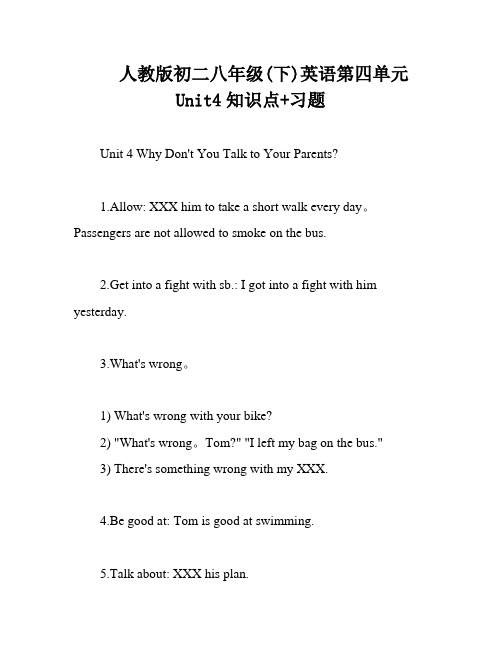
人教版初二八年级(下)英语第四单元Unit4知识点+习题Unit 4 Why Don't You Talk to Your Parents?1.Allow: XXX him to take a short walk every day。
Passengers are not allowed to smoke on the bus.2.Get into a fight with sb.: I got into a fight with him yesterday.3.What's wrong。
1) What's wrong with your bike?2) "What's wrong。
Tom?" "I left my bag on the bus."3) There's something wrong with my XXX.4.Be good at: Tom is good at swimming.5.Talk about: XXX his plan.6.On the phone。
on the。
on the。
on TV.7.XXX.: Yesterday。
XXX.25.当他害怕犯错误时,他会不敢去做某事,或者害怕某人/某事物/做某事。
26.我不会再抄他的作业了。
27.压力等同于压力,会让某人感到压力。
28.竞争:动词,与某人在某事上竞争。
竞争,竞争者。
她将参加这个舞蹈比赛。
29.XXX喜欢中国食物。
30.删除,剪下,例如:你最好删掉前两句话。
我从报纸上剪下了一篇文章。
31.在某事上获得成功,例如:她成功找到了一份工作。
32.当比赛结束时,我才会去睡觉。
当警察到达时,XXX 才离开她的办公室。
33.快速的,迅速的等同于快速的。
It's time to have XXX。
XXX went on for two minutes。
2020人教版英语八年级下册单元知识点总结和同步练习 Unit4(无答案)
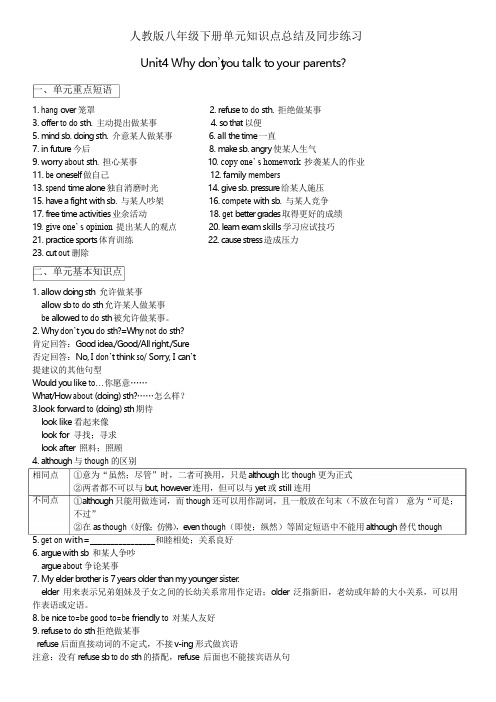
t 人教版八年级下册单元知识点总结及同步练习Unit4 Why don ’you talk to your parents?一、单元重点短语1. hang over 笼罩2. refuse to do sth. 拒绝做某事3. offer to do sth. 主动提出做某事4. so that 以便5. mind sb. doing sth. 介意某人做某事6. all the time 一直7. in future 今后8. mak e sb. angry 使某人生气 9. worry about sth. 担心某事10. copy one’ s homework 抄袭某人的作业 11. be oneself 做自己12. family members 13. spend time alone 独自消磨时光14. give sb. pressure 给某人施压 15. have a fight with sb. 与某人吵架16. compete with sb. 与某人竞争 17. free time activities 业余活动18. get better grades 取得更好的成绩 19. give one’ s opinion 提出某人的观点20. learn exam skills 学习应试技巧 21. practice sports 体育训练22. cause stress 造成压力23. cut out 删除二、单元基本知识点1. allow doing sth 允许做某事allow sb to do sth 允许某人做某事be allowed to do sth 被允许做某事。
2. Why don ’t you do sth?=Why not do sth?肯定回答:Good idea./Good/All right./Sure否定回答:No, I don ’t think so/ Sorry, I can ’t提建议的其他句型W ould you like to …你愿意……What/How about (doing) sth?……怎么样?3.look forward to (doing) sth 期待look like 看起来像look for 寻找;寻求look after 照料;照顾4. although 与 though 的区别相同点不同点 ①意为“虽然;尽管”时,二者可换用,只是 although 比 though 更为正式 ②两者都不可以与 but, however 连用,但可以与 yet 或 still 连用 ①although 只能用做连词,而 though 还可以用作副词,且一般放在句末(不放在句首) 意为“可是;不过”②在 as though (好像;仿佛),even though (即使;纵然)等固定短语中不能用 although 替代 though5. get on with=________________和睦相处;关系良好6. ar gue with sb 和某人争吵ar gue about 争论某事7. My elder brother is 7 years older than my younger sister .elder 用来表示兄弟姐妹及子女之间的长幼关系常用作定语;older 泛指新旧,老幼或年龄的大小关系,可以用 作表语或定语。
2020年春人教新目标英语八年级下册unit4知识点分析和练习(无答案)

2020年春人教新目标英语八年级下册Unit 4 why don’t you talk to your parents? 知识点一、重点短句:1.argue with =have an argument with与…争吵(辩论)2.allow sb to do sth 允许某人做某事(allow doing sth 允许做某事)3.hang out with sb 和某人出去闲逛4.too much 太多(修饰不可数名词);much too 太(修饰形容词或副词,表程度)too many 太多(修饰可数名词)。
5. look through 浏览6. work out 解决(问题);改善(状况)7.give sth back to sb 把某物归还给某人8. have a fight with sb 和某人打架。
9.be still angry with sb 仍生某人的气10.not a big deal 没什么大不了11.be good at 擅长…;be good for 对…有益;be good to 对…友好12.get on with (get along well with sb )与…相处和睦13.refuse to do sth 拒绝做某事14.instead 代替;反而(instead of )15.fell lonely and nervous 感觉孤独和不安16.offer sb sth /offer sth to sb 自愿给予某人某物17.after-school classes 课后辅助班18. be afraid of 害怕;担忧19.cut out 减少;删除;戒除pare …with …与…比较21.push their kids so hard 把孩子逼得太紧22. compete with sb 给某人压力23.each other 彼此24. all kinds of 各种各样25.development n. 发展develop v.发展26. until midnight 直到午夜developed adj. 发达的developing adj. 发展中的27.explain sth. to sb. 向某人解释某事二、重点句子:讲一讲1(section A)1. what’s the matter ? 怎么了?My brother plays his CDs too loud. 我哥哥放CD太大声。
人教版八年级下册Unit4 单元短语句子知识点总结
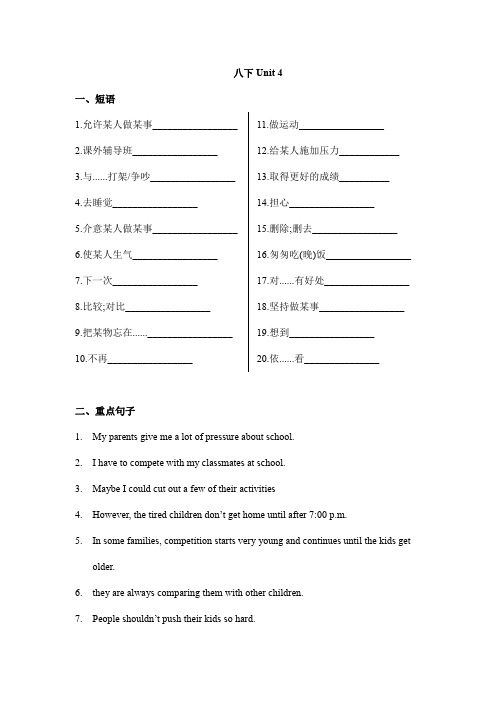
八下Unit 4一、短语1.允许某人做某事_________________2.课外辅导班_________________3.与......打架/争吵_________________4.去睡觉_________________5.介意某人做某事_________________6.使某人生气_________________7.下一次_________________8.比较;对比_________________9.把某物忘在......_________________10.不再_________________11.做运动_________________12.给某人施加压力____________13.取得更好的成绩__________14.担心_________________15.删除;删去_________________16.匆匆吃(晚)饭_________________17.对......有好处_________________18.坚持做某事_________________19.想到_________________20.依......看_______________二、重点句子1.My parents give me a lot of pressure about school.2.I have to compete with my classmates at school.3.Maybe I could cut out a few of their activities4.However, the tired children don’t get home until after 7:00 p.m.5.In some families, competition starts very young and continues until the kids getolder.6.they are always comparing them with other children.7.People shouldn’t push their kids so hard.8.Dr. Alice Green says all these activities can cause a lot of stress for children.三、知识点总结pete v. 比赛_____________________________为得到某物与某人竞争2.allow 允许,许可_____________________________. “允许某人做某事”____________________________ “允许做某事”+v_ingmunicate v.交流信息;沟通_______________________________ 和…交流/沟通4.argue 争吵,争论argue 作不及物动词,名词形式为______________,_______________________________________ “与某人争论”___________________________________ 与某人争论5.instead 代替,顶替instead副词指舍去______________,可_________,位于__________________。
Unit 4 知识点总结+单元练习题人教版英语八年级下册(附答案)
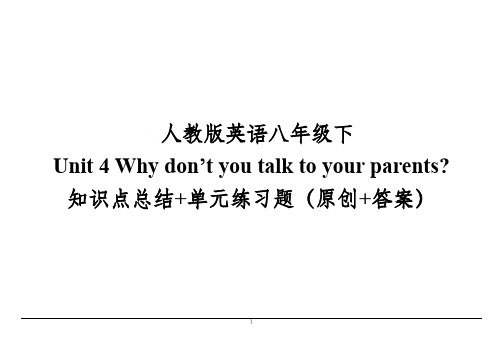
人教版英语八年级下Unit 4 Why don’t you talk to your parents?知识点总结+单元练习题(原创+答案)1一.重点词组:1.what’s wrong 哪不舒服?what’s wrong with sb 某人怎么了?2.look through 快速查看,浏览look up 查询look for 寻找look after 照顾look out = watch out 当心3.big deal 重要的事it’s not a big deal 不是要紧的事4.work out = figure out 解决,弄明白5.not...anymore 再也不6.cut out 删去pare...with 比较8.in one’s opinion 在某人看来9.hang out with sb 和某人闲逛10.after-school class 校外辅导课11.get into fight with sb 和某人打起来12.be angry with sb 对某人生气13.why don’t you do = why not do sth 为什么不做某事14.get on with sb 和某人相处得好15.be nice to sb 对某人友好16.mind sb doing sth 介意某人做某事17.on weekends 在周末二.重点单词1.allow v 允许allow doing sth 允许做某事allow sb to do sth 允许某人做某事sb is allowed to do sth 某人被允许去做某事2.guess v/n 猜have a guess = take a guess 猜一猜guess what? 您猜怎么着?3.deal v 处理;n 交易deal with sth 处理... = handle sth4.relation n 关系relative adj 相对的;n 亲戚relationship n 关系be related to sth 与...有关munication n 交流communicate v 交流6.argue v 争吵argue with sb 和某人争吵argument n 论点7.cloud n 云朵clouds 乌云8.instead adv 反而用法1:放在句首使用:She isn’t allowed to go out at this time of night. Instead, she should do her homework in her bedroom.用法2: 放在句尾连起来使用:She isn’t allowed to go out at this time of night. She should do her homework in her bedroom instead.instead of + 名词性短语9.nervous adj 焦虑的be nervous of/about sth10.offer v/n2offer sb sthprovide sth for sb = provide sb with sth supply sth for sb = supply sb with sth 11.proper adj 恰当的improper adj 不恰当的suitable adj 恰当的12.explain v 解释explanation n 解释13.clear adj 清晰的a clear day 晴天crystal clear 一清二楚的14.return v 返回return back 返还return to sb 还给某人15.member n 成员membership n 会员资格16.pressure n (物理)压力release pressure 释放压力stress (精神)压力reduce stress 减少压力pete v 竞争compete against sb 与某人竞争、攀比competition n 比赛competitive adj 竞争激烈的,好竞争的competent adj 有能力的,能胜任的18.skill n 技巧19.typical adj 典型的20.football n 美式橄榄球soccer 英式足球21.continue v 继续22.crazy adj 疯狂的be crazy about sth 对...感到痴狂23.push v 推push-up 俯卧撑pull v 拉24.develop v 发展development n 发展25.cause v 造成;n 原因cause sb to do sth 引起某人去做某事ual adj 平常的as usual 像往常一样27.perhaps adv 或许probably adv 或许possibly adv 或许34Unit 4 单元练习题一.重点词组考察二.重点单词考察三.课文翻译1. I have _____ _____ (太多) homework so I don’t have enough sleep.2. My parent don’t _____ _____ _____(允许我) hang out with my friends.3. I have _____ _____ (太多) after-school classes.4. I _____ _____ (陷入) a fight with my best friend.5. _____ _____ _____ (你为什么不)go to sleep earlier this evening?6. The house is _____ _____ (已经相当) clean and tidy.7. I found my sister _____ _____ (翻找) my things yesterday. 8. I guess you could tell her _____ _____ _____(去道歉).9. My problem is that I can’t _____ _____ _____ (和某人相处) my family. 10. My _____ _____ (大哥) is not very nice to me.11. He always _____ _____(拒绝) let me watch my favorite TV show. 12. It’s not easy _____ _____ _____ (处于你这个年龄). 13. You should _____ _____ _____ (提供去帮助).14. You don’t _____ _____ _____ _____ _____ _____ _____ (介意他一直在看电视).15. My sister borrows my clothes _____ _____ (没有问). 16. I am _____ _____ (担心) my school grades.17. You should tell him that _____ _____ _____ (抄别人的作业) is wrong. 18. _____ _____ _____ (他们中的许多人) are learning exam shills so that they can get into a good high school.19. They are always _____ _____ _____ (把他们和...做对比) other children.四.单项选择1.We can’t take this away until she _____ yes.A.will sayB. sayC. saysD. said2.She finally agrees with us _____ she did not like the plan at the beginning.A.ifB. unlessC. althoughD. when3.---Thanks for your sincere suggestion.---It’s my pleasure. Hope things _____.A.work outB. look outC. try outD. find out4.We are not allowed _____ or drink in the classroom.A.eatB. to eatC. eatingD. eaten5.The little boy _____ his book to the girl.A.providesB. suppliesC. bringsD. offers6.---Young people are always talking on their phones.---Yes, indeed. They should put down their phones and talk to people around them _____.A.stillB. eitherC. tooD. instead7.My _____ sister is three years _____ than me..A.elder; olderB. elder; elderC. older; elderD. older; older8.They didn’t leave for home _____ they finish their work.A.untilB. ifC. unless9.Chinese parents tend to compare their children _____ other kids.A.forB. toC. byD. with10.Do you mind me _____ the radio? It’s too noisy.A.turning upB. turning onC. turning downD. turn down11.Gloria offers _____ us prepare for the exams.A.helpB. to helpC. helpingD. helped12.Did you watch the TV show _____ the evening of August 24th?---Yes, I did. _____ my opinion, it’s wonderful.A.in, InB. in; OnC.on; OnD. on, In五.完形填空As though things weren’t 1._____ enough last spring, a wild turkey started showing up on my block. It’s normally one of the busiest intersections in Minneapolis, but this turkey walked down the sidewalk day after day 2._____ she belonged. As word 3._____ about her, more and more people came out to see her. A young woman told me that they had named her Tina—Tina the Turkey. Tina must have been 4._____ eggs in front of the neighbors’ house. She would sit and wiggle her rump in the same place in their yard every day. One day she walked with five other 5._____ through the parking lot, 6.______ the two-and-a-half-foot cement wall, and into the yard. I watched in surprise—six wild turkeys! One had her feathers ruffled; I think it must have been Tina. This was her 7._____ now. There were many days when Tina would stand in the parking lot—a dangerous place for a 8._____ bird—and refuse to move, blocking cars from coming or going. This became a show with Tina in the starring role until the day a new character appeared on stage: an strange-looking man with black hair. He looked 9._____. He was covered in dirt, his posture stiff. He approached Tina and began to strike curious poses in a beautiful dance. Tina 10._____ him in this dance. Together, they were art in motion. And because of the stay-at-home order, I got to see them. I’ll always remember this turkey when I think back on the corona-virus pandemic. She brought a lot of joy to a community at a time when people desperately needed an escape.1.A. funny B. strange C. wonderful D. humorous2.A. as if B. if C. even if D. even though3.A. gave out B. handed out C. set out D. got out4.A. lying B. laying C. lied D. laid5.A. neighbors B. places C. turkeys D. women6.A. on B. up C. in D. with7.A. place B. turkey C. right D. wall8.A. fat B. strong C. powerful D. slow-moving9.A. homeless B. hopeless C. strange D. careful510.A. embraced B. joined C. welcomed D. invited 答案:一.重点词组1.what’s wrong with sb2.look through3.look for4.big deal5.look out6.work out7.not ... anymore8.cut outpare ... with ...10.hang out with sb11.after-school class12.in one’s opinion13.get into fight with sb14.be angry at sb15.be friendly to/with sb16.on weekends17.sllow doing sth18.allow sb to do sth19.be allowed to do sth20.guess what21.a clear day22.crystal clear23.return back24.return to sb25.be crazy about26.cause sb to do sth27.as usualpete with/against29.help with sth630.reduce stress; release pressure31.be related to32.find sb doing sth二.重点单词1.relation2.relativemunication; communicate4.argument5.clouds6.continue7.anyway8.proper; improper9.sick; ill10.member11.membership12.neighborhood13.typical三.课文翻译1.too much2.allow me to3.too many4.get into5.Why don’t you6.already pretty7.looking through8.to say sorry9.get on with10.elder brother11.refuses to12.being your age13.offer to help14.mind him watching TV all the time15.without asking16.worried about17.copying others’ homework18.Many of thempare them with四.单项选择1-5 CCABD5-10 DAADC11-12 BD五.完形填空1-5 BADBC6-10 BADAB7。
人教版初二八年级(下)英语第四单元Unit4知识点+习题
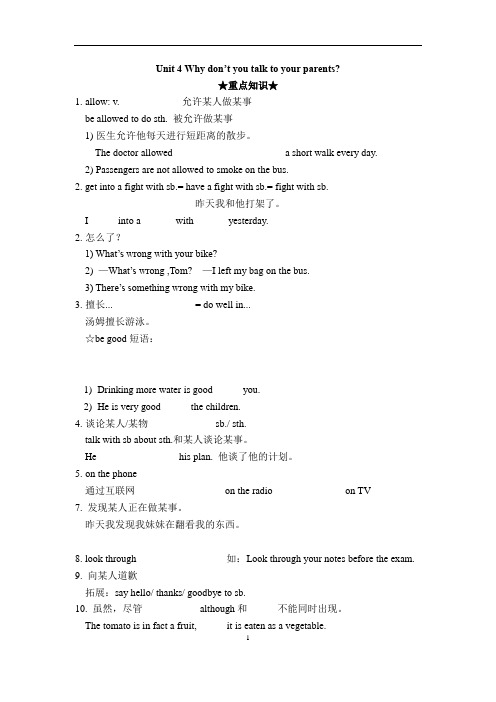
Unit 4 Why don’t you talk to your parents?★重点知识★1.allow: v. __________ 允许某人做某事__________________________be allowed to do sth. 被允许做某事1)医生允许他每天进行短距离的散步。
The doctor allowed _____ _____ _____ _____ a short walk every day.2) Passengers are not allowed to smoke on the bus.2. get into a fight with sb.= have a fight with sb.= fight with sb._____________________ 昨天我和他打架了。
I _____ into a ______ with ______ yesterday.2.怎么了?________________1) What’s wrong with your bike?2) —What’s wrong ,Tom? —I left my bag on the bus.3) There’s something wrong with my bike.3.擅长...________________ = do well in...汤姆擅长游泳。
_____________________________☆be good短语:1)Drinking more water is good _____ you.2)He is very good _____ the children.4.谈论某人/某物____________ sb./ sth.talk with sb about sth.和某人谈论某事。
He ________ _______ his plan. 他谈了他的计划。
初中英语人教新目标八年级下册Unit4Grammar预习指导(知识点+练习题)
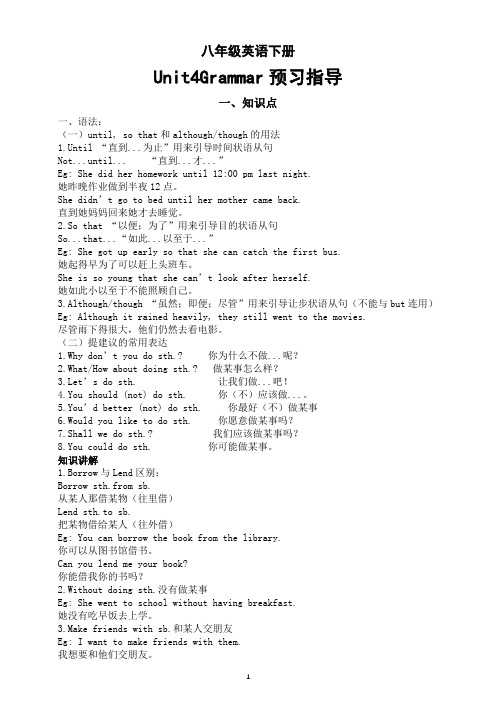
八年级英语下册Unit4Grammar预习指导一、知识点一、语法:(一)until, so that和although/though的用法1.Until “直到...为止”用来引导时间状语从句Not...until... “直到...才...”Eg: She did her homework until 12:00 pm last night.她昨晚作业做到半夜12点。
She didn’t go to bed until her mother came back.直到她妈妈回来她才去睡觉。
2.So that “以便;为了”用来引导目的状语从句So...that...“如此...以至于...”Eg: She got up early so that she can catch the first bus.她起得早为了可以赶上头班车。
She is so young that she can’t look after herself.她如此小以至于不能照顾自己。
3.Although/though “虽然;即便;尽管”用来引导让步状语从句(不能与but连用)Eg: Although it rained heavily, they still went to the movies.尽管雨下得很大,他们仍然去看电影。
(二)提建议的常用表达1.Why don’t you do sth.? 你为什么不做...呢?2.What/How about doing sth.? 做某事怎么样?3.Let’s do sth. 让我们做...吧!4.You should (not) do sth. 你(不)应该做...。
5.You’d better (not) do sth. 你最好(不)做某事6.Would you like to do sth. 你愿意做某事吗?7.Shall we do sth.? 我们应该做某事吗?8.You could do sth. 你可能做某事。
人教版八年级下册英语Unit4知识点语法归纳总结

⼈教版⼋年级下册英语Unit4知识点语法归纳总结Unit 4 Why don’t you talk to your parents?1.短语归纳2.典句必背3.⽤法集萃(1)My parents don't allow me to hang out with my friends. 我的⽗母不允许我和我的朋友们出去闲逛。
?allow作动词,意为“允许;准许”。
allow sb. to do sth. 意为“允许某⼈做某事”,也可以是allow sb. sth.例:His parents won't allow him to stay out late. 他的⽗母不允许他在外⾯待到很晚。
Each passenger is allowed 20 kilograms of baggage. 每位旅客准许携带20千克⾏李。
allow sb. to do sth.的被动结构是:“sb. be allowed to do sth.” 某⼈被允许做某事例:We are allowed to choose our own clothes. 我们被允许选择⾃⼰的⾐服。
The children are not allowed to play on this lawn. 孩⼦们不准在这块草地上玩耍。
(2)What’s wrong?怎么了?wrong作形容词,意为“有⽑病的;错误的”例:There’s something wrong with my bike. 我的⾃⾏车出⽑病了。
I’m sorry to tell you that your answers are wrong. 我很遗憾地告诉你,你的答案错了。
拓展:wrong的延伸(3)I’m really tired because I studied until midnight last night.我真的很累,因为我昨天晚上⼀直学习到半夜。
because是连词,意为“因为”,引导原因状语从句。
人教版英语八年级下册单元Unit 4 知识点+测试卷+思维导图

Unit 4 Why don’t you talk to your parents?1.重点词汇:communication, relation, allow, argue, cause, communicate, compare, compete, continue, copy, explain, guess, offer, push, return, wrong, quick, clear, crazy, nervous, proper, typical, usual, instead, perhaps, secondly....2. 短语归纳:1. look through 快速查看;浏览2. big deal 重要的事3. work out 成功地发展;解决4. get on with 和睦相处;关系良好5. cut out 删除;删去6. compare...with 比较,对比7. in one’s opinion 依……看3. 必背典句:1. Why don’t you forget about it? Although he is wrong, it’s not a big deal.你为什么不忘记呢?虽然他错了,但没什么大不了的。
2. He should talk to his friend so that he can say he’s sorry.他应该和他的朋友谈谈,这样他才能说对不起。
3. I studied until midnight last night so I didn’t get enough sleep.我昨晚一直学习到午夜,所以我没有得到足够的睡眠。
4.语法知识:1. 提建议的常用表达有:Why don’t you...?/Why not do...? (你)为什么不……呢?2. until引导时间状语从句连词until意为“直到……为止;到……时”,引导时间状语从句,常放在主句之后,也可以放在主句之前。
初二下册英语第四单元知识点归纳及达标训练(含答案)

初二下册英语第四单元知识点归纳及达标训练(含答案)今天小编为大家整理了有关初二下册英语第四单元知识点归纳及达标训练的相关内容,以供大家阅读。
更多信息请关注学习方法网!知识点:在称述句中直接引语和间接引语的转换:a)直接引语:说话人直接引用别人的原话。
b)间接引语:说话人用自己的话把别人的意思转述出来。
c)直接引语一般前后要加引号;间接引语不d)用引号。
e)规则:1)人称变化:从句中的第一人称多改为第三人称;第二人称根据情况改为第一或第三人称;第三人称不f)变。
2)时态变化:如果主句的谓语动词是一般过去时,g)直接引语变为间接引语时从句的谓语动词在时态方面要做以下变化:直接引语间接引语一般现在时一般过去时(客观真理除外)一般将来时过去将来时现在进行时过去进行时如果主句的谓语动词是一般现在时,直接引语变为间接引语时,从句的动词时态保持不变;直接引语如果是客观真理变为间接引语时,时态保持不变。
3)其他指示代词,时间状语,地点状语和动词等的变化。
直接引语中的一些指示代词,时间状语和地点状语须作相应的变化:直接引语间接引语指示代词this这these这些that那those那些时间状语now现在then那时today今天that day那天tonight今晚that night那天晚上this week这星期that week那个星期yesterday昨天the day before前一天last week上星期the week before前一个星期ago以前before以前tomorrow明天the next/following day第二天next week下星期the next week第二个星期地点状语here这里there那里动词come来go去【注意】1)直接引语中的时间状语根据实际情况转述为间接引语时,有时不需要改变,如tomorrow。
如果转述的动作发生在当天,无需改变;如果转述的动作不在当天,则需将tomorrow变为the next day.2.habit,practice,custom:habit指“个人由于自然条件,社会环境,爱好或经常接触而导致可以为常的行为或特性”;practice语气比habit弱,指“个人或大家都习惯了的做法或工作与生活的方式。
- 1、下载文档前请自行甄别文档内容的完整性,平台不提供额外的编辑、内容补充、找答案等附加服务。
- 2、"仅部分预览"的文档,不可在线预览部分如存在完整性等问题,可反馈申请退款(可完整预览的文档不适用该条件!)。
- 3、如文档侵犯您的权益,请联系客服反馈,我们会尽快为您处理(人工客服工作时间:9:00-18:30)。
Unit 4 Why don’t you talk to your parents? Section A1.Why don't you do sth ?= Why not do sth?为什么不..呢【拓展】用于提建议的句型有:(1)What about doing sth ?=How about doing sth?(2)Why don‘t you do sth?= Why not do sth?(3)Let’s do sth.让我们一起做某事吧。
(4)Shall we/I do sth?我们做…好吗?(5)had better do/not do sth 最好做/不做某事(6) Will/Would you please do sth 请你做…好吗?(7) Would you like to do sth? 你想去做某事吗?(8)Would you mind doing sth?你介意做某事吗?回答同意对方的建议时,一般用:(1) . Good idea./ That‘s good idea. 好主意(2). OK/ All right./ Great 好/ 行/太好了(3). Yes, please ./ I‘d love to 是的/ 我愿意(4). I agree with you (5). No problem(6). Sure/ Of course/ Certainly 当然可以(7). Yes, I think so 对,我也这样想对对方的帮助或要求表示委婉谢绝时,一般用:(1). I don’t think so (2). Sorry, I can’t(3). I’d love to, but… (4). I’m afraid1. Why not go to Lao She Teahouse tonight? — ______A.Sorry to hear thatB. Thank youC. Sounds great2.—I feel really tired. —______A. Lucky you!B. You’d better work harder.C. Congratulations!D. Why not go and have a rest?3.It’s a nice day, isn’t it? Yes. ___ going hiking and relax ourselves? A. Why not B. Why don’t C. What about4.You look too tired. Why not _____ a rest? A. Stop to have B. to stop having C. stop having2.I have to study too much so I don’t get enough sleep. 我要学的太多,因此我睡眠不足。
1.What’s the matter?I have a stomachache. Maybe I have eaten __ tonight.A. too muchB. too manyC. much too2. The shops were closed_______ I didn't get any milk.A. soB. asC. orD. but3. My parents don’t allow me to hang out with my friends 我的父母不允许我和我的朋友们出去闲逛。
allow sb. to do sth 允许某人做某事 allow doing sth 允许做某事My mother allows me________( watch) TV. We don’t allow ___________(smoke) in the reading room. Our teacher allows us ____________(go) out for a walk.4. I’m really tried because I studied until midnight lastnight. 我真的很累,因为我昨晚一直学习到半夜。
until 直到......时1. Please hold on to your dream _____ one day it comes t rue. A. if B. until C. unless D. though2. Hey, man. You can’t cross the street now. You have to wait ___the traffic turn green. Oh, sorry and thank you.A. whenB. afterC. untilD. while5.Why don’t you go to sleep earlier this evening?今天晚上你为什么不早点睡觉呢?go to sleep 去睡觉 (强调“入睡,睡着”这一动作)6. You look sad, Kim. 金,你看起来很伤心。
look 看起来(系动词,后跟形容词作宾语)Some of friends eat with their eyes. They prefer what __ __ nice. A. feels B. smells C. looks D. tastes系动词:后跟adj. 作表语一是:(be) am /is /are be quiet=keep quiet 保持安静二保持:stay/keep stay healthy=keep healthy 保持健康三变化:become/get/turn (表示状态变化)五起来:sound/look/smell/taste/feel (表示感觉)( )Jack usually gets ______ when he speaks in public.A. happilyB. excitingC. worriedD. tired( ) Tom’s father looks very _____. But he is very kind.A. seriouslyB. seriousC. friendly7.Well, I found my sister looking through my things yesterday. 哦,昨天我发现我妹妹翻了我的东西。
find sb. doing sth 发现某人正在做某事Mr. Wang found Li Dong__( read)a storybook in the class.类似动词:hear,watch, see, feel,noticeWhen I went into the room, I found ___ in bed.A. him lyingB. he lyingC. he liesD. him was lyinglook through 浏览与look相关的短语:照看_____________ 看起来一样______________小心,从里向外看_______向上看,查单词_________环视 ______________ 期望 ____________________9. Can you help me to _______ my dog when I leave forHong Kong? A. look after B. look through C. look at30. Here is the book. First _________ it and then tell mewhat you think of it. A. look into B. look through C. loo k up D. look after10. Yes, but I’m still angry with her. 是的,但是我仍然很生她的气。
angry → angrily (1)be angry with sb. 对某人生气(2)be angry at/about sth对某事感到生气 (3)be angry to do sth 做某事感到生气My father was very _______(_生气)his computer.He hit the computer _______(angry)— Why are you unhappy, Kate?— I didn‘t finish my homework again. I‘m afraid Miss Gao will be ___ me. A. angry with B. friendly toI was very angry ___ myself ___ making such as a stupidmistakes. A. with; for B. at; with C. with; at10. I felt sorry that I dropped the juice on Tina‘s bed.But she wasn‘t __at all. A. excited B. happy C. angry11.Although she’s wrong, It’s not a big deal. 尽管她错了,但也不是什么大错。
although= though 尽管 , 步状语从句。
不与but连用____ my father isn‘t pleased with his working environme nt , he still works hard. A. Before B. Although C. But41. The boy can speak both English and Japanese ,____he is only ten. — Wow, what a clever boy!1You left your homework at home. 你把作业忘在家里了。
leave v 遗忘,留下 leave sth . somewhere把某物忘在某地 leave sb. by oneself 把某人单独留下22.Sorry, Mr. Green. I have ____ my homework at home. —Never mind. But don't forger next time.A. putB. keptC. leftD. remained12. Hope things work out. 希望事情顺利解决。
